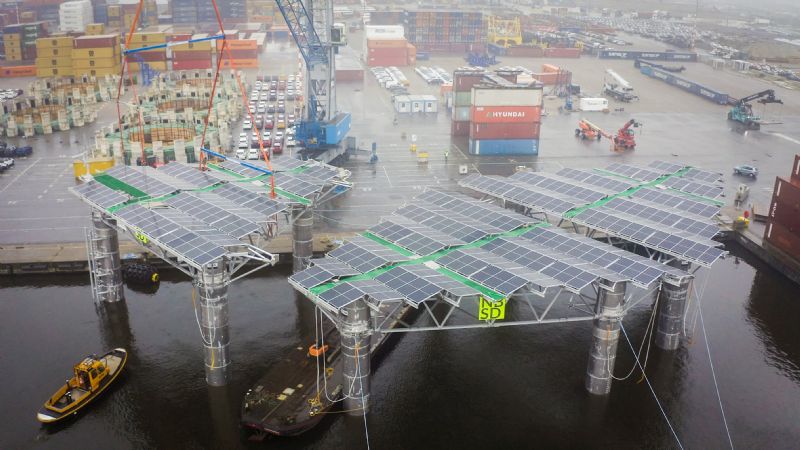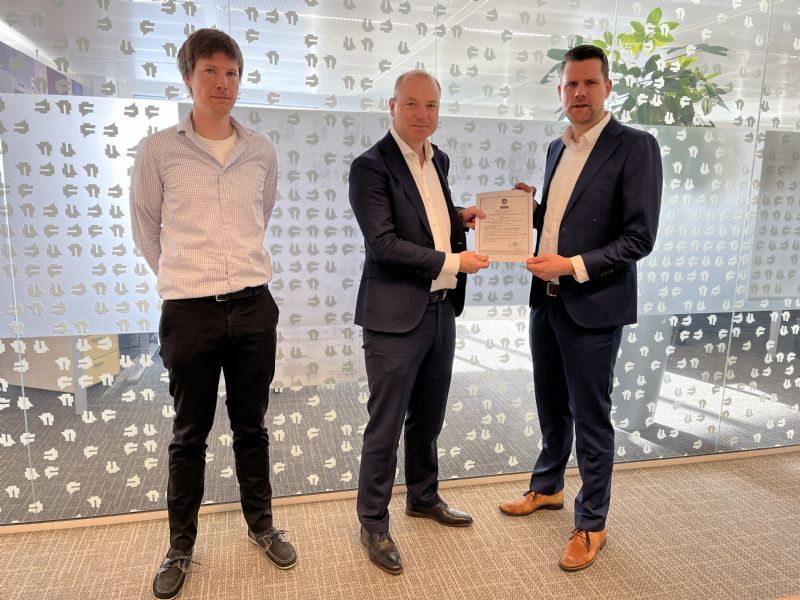
Merganser receives certification from Bureau Veritas
Bureau Veritas Awards World’s First Prototype Certification for SolarDuck's Floating Offshore Solar Solution
Bureau Veritas (BV), a global leader in testing, inspection, and certification (TIC), has awarded the Dutch-Norwegian renewable energy company SolarDuck the world’s first Prototype Certification for a floating offshore solar technology, as applied in SolarDuck’s 0.5 MW pilot "Merganser". This certification represents a significant step forward in the development of marine renewable energy technologies for offshore applications.
The Merganser project, developed by SolarDuck and supported by RWE, features an offshore floating solar pilot with a capacity of 520 kWp. Comprising six interconnected platforms, the solution is designed to withstand challenging offshore conditions, including high waves, strong winds, and corrosive environments. The design has been certified to withstand a maximum wave height of 11.6 meters (with a directional 10-year return period) at a water depth of 21.5 meters (MSL) at the North Sea Farmers test site. It will be deployed off the coast of The Hague, Netherlands, providing a real-world operational environment to evaluate its performance and resilience in the dynamic North Sea.
Bureau Veritas has been actively supporting SolarDuck in its pioneering efforts to develop floating solar solutions. The certification of the Merganser prototype follows the Approval in Principle (AiP) granted for its floating structure. Throughout the certification process, Bureau Veritas meticulously evaluated the prototype against rules and standards, including guidance note NI631 on the Certification Scheme for Marine Renewable Energy Technologies. These assessments covered various aspects such as the floating structure, mooring system, stability analysis, materials, and electrical safety systems. Moving forward, the technology will be further evaluated for a type certification.
Don Hoogendoorn, CTO of SolarDuck, commented: “A key step in making the technology bankable is obtaining certification of the technology. As long-standing partners, SolarDuck has cooperated closely together with Bureau Veritas to verify the technology for the harsh North Sea conditions, marking a significant milestone in the development of our offshore floating solar technology”.
“The certification of SolarDuck's prototype Merganser reflects the collaborative efforts between Bureau Veritas and industry innovators in advancing sustainable energy solutions. Our expertise in assessing structural integrity and conducting design evaluations played an important role in meeting technical standards, highlighting our commitment to fostering innovation while ensuring safety and reliability in offshore renewable energy projects”, says Martijn Nieuwenhuijs, Country Chief Executive, Bureau Veritas Marine & Offshore Netherlands.


SolarDuck is a Dutch company specializing in the development and implementation of innovative floating solar solutions. Here are some key points about SolarDuck:
Focus on Floating Solar: SolarDuck focuses on the design, development, and deployment of floating solar photovoltaic (PV) systems. These systems involve solar panels mounted on floating platforms that are typically installed on bodies of water such as reservoirs, lakes, ponds, and coastal areas.
Technology and Innovation: SolarDuck is known for its innovative approach to floating solar technology. The company may utilize advanced engineering and materials to create durable and efficient floating platforms for solar panels.
Benefits of Floating Solar: Floating solar installations offer several advantages, including efficient land use (especially for countries with limited land availability), reduced water evaporation in reservoirs, improved solar panel performance due to cooling effects of water, and potential synergies with hydropower or water treatment infrastructure.
Environmental Sustainability: Floating solar is considered a sustainable and renewable energy solution that contributes to reducing greenhouse gas emissions and mitigating climate change. It aligns with global efforts to transition to clean energy sources.
Market Presence: SolarDuck operates in the renewable energy sector and is part of the growing industry focused on solar energy solutions. The company may collaborate with energy developers, utilities, government agencies, and other stakeholders interested in expanding their renewable energy portfolios.
Global Reach: While SolarDuck is based in the Netherlands, its solutions and expertise may be applicable to various regions worldwide where floating solar installations can offer significant benefits.
For the most current and detailed information about SolarDuck, including its latest projects, technologies, partnerships, and market developments, I recommend visiting SolarDuck's official website, reviewing industry news, or contacting the company directly for specific inquiries.
We use cookies to improve your experience. By continuing to use our site, you accept our Cookies, Privacy Policy,Terms and Conditions. Close X